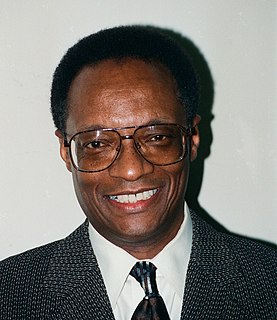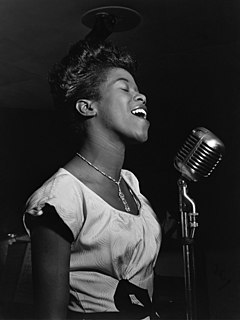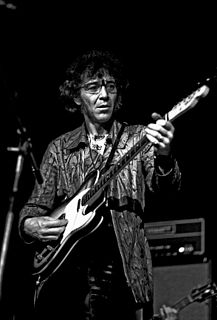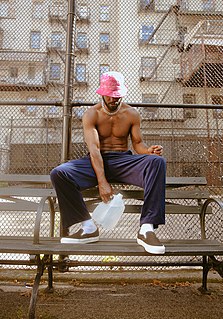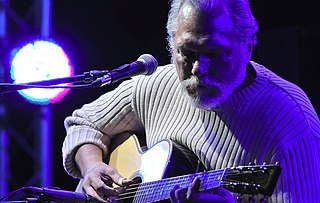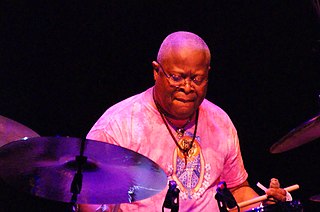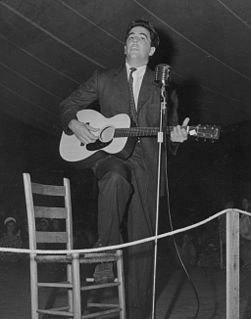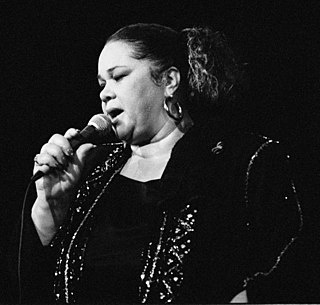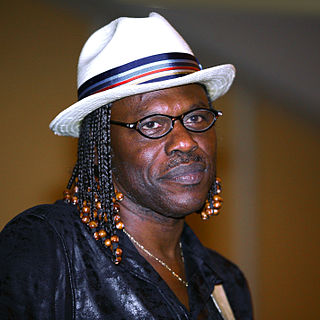A Quote by Ramsey Lewis
Everything comes from one thing, everything comes from the Spirit. Jazz would not exist had it not been for gospel music, the blues would not exist had it not been for spiritual blues, which goes back to slave songs our fore fathers were singing while they were out in the field. So it's all one continuous growth from one group of people. Of course jazz now is played by various cultures and colors around the world. But the stimulus is One Voice.
Quote Topics
Around
Around The World
Back
Been
Blues
Colors
Continuous
Continuous Growth
Course
Cultures
Everything
Exist
Fathers
Field
Fore
Goes
Gospel
Gospel Music
Group
Growth
Had
Jazz
Music
Now
One Thing
Our
Out
People
Played
Singing
Slave
Songs
Spirit
Spiritual
Stimulus
Thing
Various
Voice
Were
Which
While
World
Would
Related Quotes
I visited New York in '63, intending to move there, but I noticed that what I valued about jazz was being discarded. I ran into `out-to-lunch' free jazz, and the notion that groove was old-fashioned. All around the United States, I could see jazz becoming linear, a horn-player's world. It made me realize that we were not jazz musicians; we were territory musicians in love with all forms of African-American music. All of the musicians I loved were territory musicians, deeply into blues and gospel as well as jazz.
I don't know why people call me a jazz singer, though I guess people associate me with jazz because I was raised in it, from way back. I'm not putting jazz down, but I'm not a jazz singer...I've recorded all kinds of music, but (to them) I'm either a jazz singer or a blues singer. I can't sing a blues – just a right-out blues – but I can put the blues in whatever I sing. I might sing 'Send In the Clowns' and I might stick a little bluesy part in it, or any song. What I want to do, music-wise, is all kinds of music that I like, and I like all kinds of music.
We don't live in a jazz world, unfortunately. I think if I had lived in a jazz world, I would have done OK. I'm not sure I would have done great. I'm a lover of jazz music, so I would have been happy, don't get me wrong. I go to jazz concerts like the biggest jazz fan in world. The drag is that I don't play jazz for a living.
If a slave were to raise his voice to his master, he risked all manner of punishment. Yet what was possible in many circumstances was to lift one's voice in song. This was a major ingredient in what is now known as blues and gospel. Slaves may have been regarded as subhuman by their cruel captors, but through music, they were proud and dignified.
Truth of the matter is, jazz is American music. And that doesn't mean bebop. Jazz is really about improvising. All the music that's been created in America has been pretty much improvised... Whether it's hillbilly or rock n' roll for blues, it's basically jazz music... It's basically about another way of hearing what comes out of America.
But black folks have never really been optimists. We've been prisoners of hope, and hope is qualitatively different from optimism in the way that there's a difference between The Blues and Lawrence Welk. The Blues and Jazz have to do with hope while the other is sugarcoated music which has to do with sentimental optimism.
I'm a bluesman moving through a blues-soaked America, a blues-soaked world, a planet where catastrophe and celebration... "Joy and Pain" - sit side by side. The blues started off in some field, in some plantation, in some mind, in some imagination, in some heart. The blues blew over to the next plantation, and then the next state. The blues went south to north, got electrified and even sanctified. The blues got mixed up with jazz and gospel and rock and roll.
It seems all worlds of music - rock, blues, R&B, soul, hip-hop and others - are able to point to impromptu get-togethers as proud moments in their timelines, encounters that were recorded and created music of lasting impression. In the jazz tradition, there are a few, but none that has been revered for as long as Jazz at Massey Hall.
Nowadays blues in particular has a wide, wide, wide, wide net of everything that's called blues. I think if somebody's coming to it in the last ten years or whatever, or even fifteen years, what their experience is what is called blues is different from mine. I have to expand my range of what's been called the blues. I think somebody who's new to it would have to go back and to see what is called blues now, where it came from. If that makes sense.
